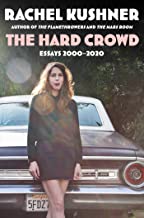The Hard Crowd by Rachel Kushner 2021
Kushner has written several acclaimed novels nominated for major literary prizes, but this is her first volume of non-fiction. It gathers essays published from 2000-2020 in leading periodicals (New York Times Magazine, London Review of Books, Vogue, Paris Review), but in a typical example of this frustrating collection, the essays don’t seem to be ordered or grouped in any coherent way.
I nearly stopped reading this book several times before finally deciding to plow through to the end. That decision was mostly due to the fact that the book had been given to me by my sister who has over the years given me many books and every one has been a hit. This one, not so much. I think that it’s due to my attitude towards the personal essay, a form which I hold in high regard and almost always read with enjoyment. But I’ve come to learn that my enjoyment of an essay depends on it having at least one of three characteristics: I like the author; I like the topic; I like the style. In Kushner’s case, while I was not at all drawn to her as an individual (too young, too fringe, too far from my comfort zone), I did find some of the essays to be interesting and nearly all of them to be very well written. I just could not get into the 1970 scene in Italian cinema or the grunge bands and drugs in San Francisco.
Nonetheless, I did enjoy her book reviews of the work of Denis Johnson, Cormac McCarthy, Marguerite Duras, and especially Clarice Lispector, a writer who I did not previously know. Lispector’s family fled the pogroms of early 20th C Ukraine and landed in Brazil where she became that nation’s leading author and was widely read. Some of Kushner’s art reviews were excellent also.
My favorite slice of writing came in the final essay which, ironically, was my least favorite, The Hard Crow which dealt with her early years as a bartender in San Francisco’s rough areas. Kushner riffs on s reference to a Bob Dylan lyric that Jimmy Carter makes in his 1976 acceptance speech at the Democratic Convention in Madison Square Garden when he said “America was busy being born, not busy dying.” Dylan’s actual lyric was “He not busy being born is busy dying.” Kushner goes on to write: ” You are busy being born the whole first long ascent of life, and then, after some apex, you are busy dying…The dying doesn’t have to be negative. It is too open an existential category of being: the age when the bulk of your experience, the succession of days lived in the present are mostly over. You turn reflective, interior, to examine and sort and tally. You reach a point where so much is behind you, but its scenes continue to exist somewhere, as memory and absence at once, as images you’ll never see again. None of it matters; it is gone. But it all matters; it lingers. The whole of youthful experience has slid away, the years and the people, the moments and feelings. In all that loss, a person continues to locate little tokes of joy from new and surprising places. Still learning, still becoming. Busy being born, and busy dying. You have a present, a now, even as you drag with you a snowballing bulk of what was. Sometimes you spike a new joy, you really do, and sometimes you hit an old one, and the more you’ve lived the more there are of the old ones.”
That is real writing and made the slog through the other 250 pages worth it. Wow!



